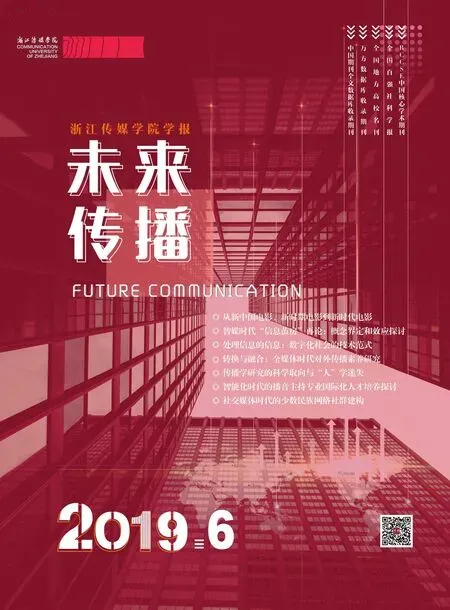ABSTRACTS
FromNewChinaFilms,NewEraFilmstoNewTimesFilms——OntheDevelopmentof70Years’FilmsinNewChina
Yin Hong
From 1949 to 2019, Chinese 70-year film industry is going through three important stages of development. During the period of socialist revolution and construction in New China, a number of classic texts of Chinese socialist films were created, especially from 1959 to 1965, which was the first creation peak. In the new era of Reform and Opening-up, Chinese films experienced the development process of "Scar", "reflection", "reform" and "root seeking", which had an important international influence. At the same time, they also entered a golden age in the development of film industry. In the new times of national rejuvenation, we should gather social consensus, spread mainstream values, and complete the transformation from a big country to a powerful country. In the three historical stages, Chinese films have formed different themes, aesthetic styles, narrative ways, and communication directions.
FurtherDiscussionon"InformationCocoons"intheEraofIntelligentMedia:ConceptDefinitionandEffectDiscussion
Li Wu, AI Pengya & Yang Yunqing
With the development of media technology, personalized recommendation technology has been widely used in the era of intelligent media, which to a large extent aggravates people's concern about "information cocoons". This paper redefines the concept of "information cocoons", divides it into different types due to self selection and algorithm recommendation, and explores the theoretical basis and empirical basis for the existence of the effects of "information cocoons". The findings show that although there are strong relation between self selection and algorithm recommendation, and between information narrowing and opinion polarization, these correlations have not been supported by sufficient empirical research. Nevertheless, it is still necessary to worry about and reflect on the effect of "information cocoons" .
InformationofProcessingInformation:theTechnologicalParadigmofDigitalSociety——FromthePerspectiveofCastells’TechnologyParadigm
Ling Yuqiao
5G technology will make our life and society more thoroughly and comprehensively digital, and we have entered the digital society. With the emergence of "network society", Castells argues that the core of its technological paradigm lies in the transformation of "technology-processing information" into "information-processing technology", and so "network society" occurs. From his perspective, under 5g technology, "digitalization" will surpass and condense the expression of "informatization" and "Networking". In this case, we call it "digital society". Influenced by 5G communication technology, the technology paradigm in "digital society" will also be turned into "information of processing information" Under the paradigm of "information of processing information", technology does not disappear but hides behind the scenes. When "technology" is no longer a bottleneck, people turn back to the most essential demand for "information". Castells' "network society" theory provides an explanation path for the current understanding of "digital" and "digital society".
TransformationandIntegration:aStudyofExternalCommunicationLiteracyintheEraofWhollyMedia
Li Weiwei & Yuan Jun
In the past ten years, China's comprehensive national strength has been greatly improved. With the deepening of the "One Belt and One Way" initiative, it has become an integral part of the overall national development strategy to tell a good story of China, inspire the cultural creativity of the whole nation, and enhance the soft power of the national culture. External communication plays a key role in the new situation of world multipolarization, economic globalization, social informatization and cultural diversity, and in the era of all-round, holographic, all staff and all effective media. With the development of information technology, new media and traditional media have realized effective interaction, the quality of external communication, improved, and the transformation of multiple perspectives and the integration of different models, strengthened, which helps to depart from the situation of losing power of traditional media, and come close to the media integration, so that China's external communication has both the "top-down" theoretical nature and "bottom-up" operability so as to build a global pattern of China's external communication.
TheScientificOrientationofCommunicationResearchandtheLostof"Human"
Fang Jianyi
Communication has been greatly influenced by behaviorism research paradigm since its birth. Under the banner of scientific research methods and accurate research results, there exists a tendency to deviate from the ultimate goal of research, neglecting human dignity in the process of research, and sometimes even becoming a tool of enslavement. Under the historical background of socialism with Chinese characteristics entering a new era, it is necessary to face up to the alienation of communication studies, so that they can return to the essence of human beings and better serve the realization of human values.
DiscussionontheCultivationofInternationalTalentsinBroadcastingandAnnouncingMajorintheEraofArtificialIntelligence——InspirationfromBritishBroadcastingEducation
Dai Yuncai & Yao Zheng
It is essential to redesign the cultivation of broadcasting and announcing talents to keep pace with the global economic, societal, and technological progress. In view of this, the article analyzes the necessity of meeting demands of society and trades by adjusting educational objectives of broadcasting and announcing program together with stretching its academic structure and enhancing the media application ability of learners. Furthermore, it points out specific routes of the specialty upgrading and strategies of ability improvement so as to nurture more cross-disciplinary talents with international views on the basis of the experience of UK similar programs and AI technology.
ConstructionofMinorityNetworkCommunityintheEraofSocialMedia
Zhang Yuan
The paper explores the construction of minority network communities in virtual space by social media's connection to discrete minority interpersonal relationships. Firstly, the significance and value of minority identity research from online and social media are analyzed. Then from the characteristics of social media, the author explores how the online community converges the minority group identity across time and space. Finally, by analyzing the social media of minorities, the essay discusses the construction of identity in the online community. The findings are that minorities in the social media rely on the past nostalgia and selective memories, identity trace-ability based on geopolitical relationship, the origin of a sense of fate in order to construct a group and strengthen group identity. They apply the synchronic imagination to draw closer to each other, thus constructing an imaginary community.

